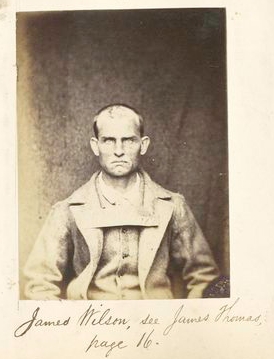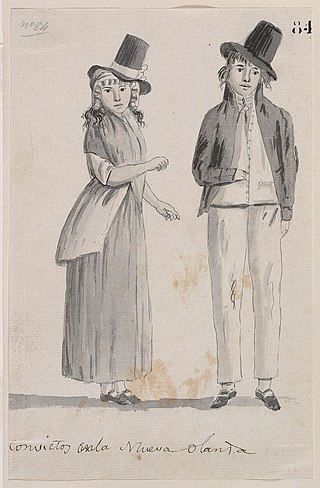Related Research Articles

Bushrangers were originally escaped convicts in the early years of the British settlement of Australia who used the bush as a refuge to hide from the authorities. By the 1820s, the term had evolved to refer to those who took up "robbery under arms" as a way of life, using the bush as their base.

In criminal justice, particularly in North America, correction, corrections, and correctional, are umbrella terms describing a variety of functions typically carried out by government agencies, and involving the punishment, treatment, and supervision of persons who have been convicted of crimes. These functions commonly include imprisonment, parole, and probation. A typical correctional institution is a prison. A correctional system, also known as a penal system, thus refers to a network of agencies that administer a jurisdiction's prisons, and community-based programs like parole, and probation boards. This system is part of the larger criminal justice system, which additionally includes police, prosecution and courts. Jurisdictions throughout Canada and the US have ministries or departments, respectively, of corrections, correctional services, or similarly-named agencies.

A penal colony or exile colony is a settlement used to exile prisoners and separate them from the general population by placing them in a remote location, often an island or distant colonial territory. Although the term can be used to refer to a correctional facility located in a remote location, it is more commonly used to refer to communities of prisoners overseen by wardens or governors having absolute authority.
A convict is "a person found guilty of a crime and sentenced by a court" or "a person serving a sentence in prison". Convicts are often also known as "prisoners" or "inmates" or by the slang term "con", while a common label for former convicts, especially those recently released from prison, is "ex-con" ("ex-convict"). Persons convicted and sentenced to non-custodial sentences tend not to be described as "convicts".

Penal transportation was the relocation of convicted criminals, or other persons regarded as undesirable, to a distant place, often a colony, for a specified term; later, specifically established penal colonies became their destination. While the prisoners may have been released once the sentences were served, they generally did not have the resources to return home.

A chain gang or road gang is a group of prisoners chained together to perform menial or physically challenging work as a form of punishment. Such punishment might include repairing buildings, building roads, or clearing land. The system was notably used in the convict era of Australia and in the Southern United States. By 1955 it had largely been phased out in the U.S., with Georgia among the last states to abandon the practice. North Carolina continued to use chain gangs into the 1970s. Chain gangs were reintroduced by a few states during the "get tough on crime" 1990s: in 1995 Alabama was the first state to revive them. The experiment ended after about one year in all states except Arizona, where in Maricopa County inmates can still volunteer for a chain gang to earn credit toward a high school diploma or avoid disciplinary lockdowns for rule infractions.

Parole is a form of early release of a prison inmate where the prisoner agrees to abide by certain behavioral conditions, including checking-in with their designated parole officers, or else they may be rearrested and returned to prison.

The Macquarie Harbour Penal Station, a former British colonial penal settlement, established on Sarah Island, Macquarie Harbour, in the former colony of Van Diemen's Land, now Tasmania, operated between 1822 and 1833. The settlement housed male convicts, with a small number of women housed on a nearby island. During its 11 years of operation, the penal colony achieved a reputation as one of the harshest penal settlements in the Australian colonies. The formal penal station is located on the eight-hectare (twenty-acre) Sarah Island that now operates as an historic site under the direction of the Tasmania Parks and Wildlife Service.
Alexander Maconochie was a Scottish naval officer, geographer and penal reformer.
The history of Australia from 1788 to 1850 covers the early British colonial period of Australia's history. This started with the arrival in 1788 of the First Fleet of British ships at Port Jackson on the lands of the Eora, and the establishment of the penal colony of New South Wales as part of the British Empire. It further covers the European scientific exploration of the continent and the establishment of the other Australian colonies that make up the modern states of Australia.
The Comptroller General of Convicts was the head of the convict establishment in Western Australia.

The convict era of Western Australia was the period during which Western Australia was a penal colony of the British Empire. Although it received small numbers of juvenile offenders from 1842, it was not formally constituted as a penal colony until 1849. Between 1850 and 1868, 9,721 convicts were transported to Western Australia on 43 convict ship voyages. Transportation ceased in 1868, but it was many years until the colony ceased to have any convicts in its care.

A prison officer (PO) or corrections officer (CO) also known as a Correctional Law Enforcement Officer or less formally as a prison guard is a uniformed law enforcement official responsible for the custody, supervision, safety, and regulation of prisoners. They are responsible for the care, custody, and control of individuals who have been convicted of a crime and sentenced to imprisonment. They are also responsible for the security of the facility and its property as well as other law enforcement functions. Most prison officers or corrections officers are employed by the government of the jurisdiction in which they operate, although some are employed by private companies that provide prison services to the government.

Between 1788 and 1868, about 162,000 convicts were transported from Great Britain and Ireland to various penal colonies in Australia.

William Westwood, also known as Jackey Jackey, was an English-born convict who became a bushranger in Australia.
Female factories were based on British bridewells, prisons and workhouses. They were for women convicts transported to the penal colonies of New South Wales and Van Diemen's Land.
Convict women in Australia were British prisoners whom the government increasingly sent out during the era of transportation (1787-1868) in order to develop the penal outpost of New South Wales into a viable colony.

Kingston and Arthurs Vale Historic Area (KAVHA) is an old settlement on the Kingston coastal plains, southern side of Norfolk Island, consisting of a large group of buildings from the British Empire's convict era (1788–1855), now considered to be of such cultural significance to Australia and to the World that the area has been formally inscribed onto both the Australian National Heritage List and UNESCO's World Heritage list as amongst:
" .. the best surviving examples of large-scale convict transportation and the colonial expansion of European powers through the presence and labour of convicts."

James Hardy Vaux was an English-born convict transported to Australia on three separate occasions. He was the author of Memoirs of James Hardy Vaux including A Vocabulary of the Flash Language, first published in 1819, which is regarded as both the first full length autobiography and first dictionary written in Australia.

Charles O'Hara Booth, was an English-born army officer who served in India, the West Indies and England for a total of 18 years before being posted to Van Diemen's Land, Australia. He remained there for a further 18 years, first as commandant of Port Arthur penal settlement and subsequently as the head of an orphan's school.
References
- ↑ "Arrival of the "Scindian" with Convicts". The Perth Gazette and Independent Journal of Politics and News . Vol. 3, no. 131. Western Australia. 7 June 1850. p. 2. Retrieved 2 September 2019– via National Library of Australia.